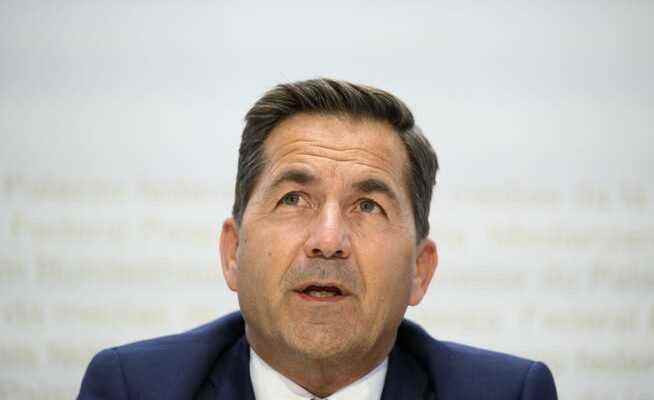During the pandemic, the federal crisis managers have failed to think in scenarios and also to take the worst possible turns into account. This is the conclusion of a new report on the Corona crisis. At least there are signs that the administration is capable of learning.
Federal Chancellor Walter Thurnherr will speak about the federal administration’s crisis management on June 22, 2022 in Bern.
He is one of the brightest minds in administration: Federal Chancellor Walter Thurnherr. His word carries weight in the Federal Council. As the government’s chief of staff, he attends the weekly meetings. On Wednesday, Thurnherr presented a report from the Federal Chancellery on the federal administration’s crisis management from summer 2020. The deadly second wave of autumn 2020 fell during this period. The report is based on a self-analysis by the administration and the assessment of the cantons and third parties involved, such as the FMH Medical Association.
Thurnherr’s most important conclusion from the Corona crisis: “Most of the time it’s more stupid than you think.” For a long time, the attitude that prevailed in the administration was that things would be fine, the bad things happened abroad. You didn’t even think about all the surprises and bad things that could happen.
Management learns
This topic runs like a red thread through the results of the evaluation. In official German it then goes like this: At the strategic level, the anticipation of possible crises and situation developments in such a situation is in need of improvement. In some areas of the federal administration, there was a lack of forward-looking crisis management. This
This was particularly evident in autumn 2020, when the federal administration and the cantons were insufficiently prepared for the extent of the second wave of infections.
After all: According to Thurnherr, Corona has led to a learning process in the administration. The sensitivity has increased that things could be worse than initially assumed. He cited the current dangers of a power or gas shortage as examples. Those responsible in the Energy Department and in the Federal Office for National Economic Defense would now also examine scenarios that deviated from the usual thinking patterns.
The Federal Chancellor was most surprised by the deep mutual misunderstanding between politics and science. Thurnherr is also quite self-critical. The federal government should have used the science task force much earlier. It is now a question of being able to better tap knowledge for future crises. “Scientists need to know what we expect from them and how to communicate,” said Thurnherr. The communication of the science task force caused irritation and tension in the public more than once. And Thurnherr appeals to politicians to get more involved with the facts.
Covid task force: High credibility
A comparison with the scientific policy advice in Germany, France, Italy and Great Britain attests the Swiss Covid Task Force a high level of credibility. At the same time, the report by the universities of Bern and Lausanne criticizes the fact that the existing pandemic commission has not been included in the crisis management. Due to its strong anchoring in the federal administration, in the cantons and among medical stakeholders, this has potential that should be better exploited in the future, write the authors of the study.
Because the Covid task force was new, a culture of collaboration had to be built first. This affected the communication flows, the construction of a
relationship of trust and the definition of roles and procedures. Time and energy were lost in the process. According to the study, the cooperation of the vaccination commission was different to that of the task force
the administration easily.
«Good conditions for future crises»
In addition to the inclusion of science, the organization of crisis management in the federal administration and the coordination between the federal government and the cantons as well as between the cantons are among the biggest areas of work that the report reveals. A total of 13 recommendations are derived from this, which the Federal Council accepted on Wednesday.
The Federal Chancellery and Defense Department are tasked with presenting the government with proposals for organizing crisis management at a strategic and operational level by March 2023. Tasks, competencies and responsibilities are to be better distributed and possible trigger criteria for a cross-departmental crisis structure are to be defined. It was at the strategic level in particular that the greatest problems were encountered during the pandemic.
Cooperation between the federal government and the cantons was poor, especially in the second, deadly wave. People shied away from making decisions and blamed each other for responsibility. The Federal Council now wants to review the inclusion of the cantons in the federal administration’s crisis management. The flow of information should be improved.
“Switzerland has good prerequisites for overcoming future crises,” said Thurnherr. But the but follows immediately: We are used to long processes, careful checking, multiple consultations and careful consideration. But there is no time for that in a crisis. It is important to learn lessons from this and not just go back to business as usual. The Federal Chancellor means: prepare more, think in scenarios, communicate more and better. Because the next crisis will come at some point, and it will be different than we imagined.
